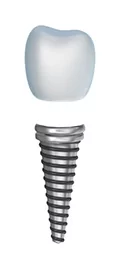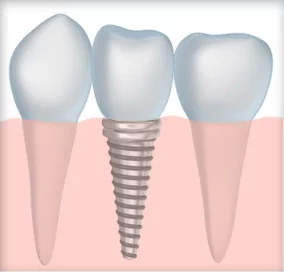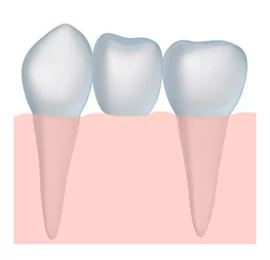- What Are Dental Implants?
- How Dental Implants Work
- The Dental Implant Procedure
- Benefits & Advantages of Dental Implants
- Advantages of Getting Dental Implants with Blaisdell Family Dentistry
- What Are the Differences in the Dentures or Implants Options?
- Are There Other Procedures Besides Dentures or Tooth Implants?
- How to Choose a Dentist for Dental Implants
- Am I a Candidate for Implant Dentistry?
- Implant Dentistry FAQs
What Are Dental Implants?
Implant dentistry has changed the game when it comes to cosmetic and restorative dentistry. Simply put, dental implants are artificial teeth roots to support the replacement of missing or fully decayed teeth. At first, that might not sound very impressive, but implant dentistry at our Boise office solves many common problems and issues associated with traditional restorations like dental bridges and dentures.
Pretty much a miracle, our satisfied patients say! Dental implants are small metal (titanium) rods placed into your gums that fuse with your jawbone. We place temporary dental crowns on the dental implants while they heal, which typically takes between 3–6 months. A dental implant is simply a “new” tooth root and a “new” tooth”!
How Dental Implants Work
Dental implants have transformed the realm of tooth replacement, offering a robust and natural-looking alternative for those missing teeth. Here’s a breakdown of their structure:
- Implant Post: Often crafted from titanium, this acts as the new tooth root. It’s surgically anchored into the jawbone and, over a span of several months, undergoes osseointegration. This process sees the post fuse with the bone, creating a strong foundation.
- Abutment: Once the post is securely fused with the jawbone, the abutment is attached. This serves as the connector between the implant post and the crown, effectively bridging the gap.
- Crown: Custom-made to blend seamlessly with your natural teeth in terms of shape and shade, the crown is affixed to the abutment. This is the visible part of the tooth and is designed for both aesthetics and function.
Following the primary implant surgery, patients can expect a healing timeline ranging between 3–6 months before the crown is placed. During this period, temporary solutions may be used to uphold the appearance and functionality of the tooth. With appropriate care, the final result is a resilient and seamlessly integrated tooth, poised to last for years.
The Dental Implant Procedure: A Step-by-Step Journey at Blaisdell Family Dentistry
At Blaisdell Family Dentistry, we guide you through the dental implant process with expertise and care. Here is how we handle the procedure, step-by-step:
- Your Personalized Consultation & Evaluation: Your journey begins with a comprehensive consultation with Dr. Blaisdell. We’ll conduct a thorough oral examination, review your medical history, and take detailed images using our state-of-the-art Cone Beam 3D Imaging technology. This allows us to precisely assess your bone density, identify any anatomical considerations, and create a customized treatment plan tailored to your unique needs. We’ll discuss your goals, answer all your questions, and explain the entire process in detail so you feel fully informed and comfortable.
- Precise Implant Placement: On the day of your implant surgery, your comfort is our top priority. We offer various sedation options, including laughing gas and oral conscious sedation, to help you relax during the procedure. Dr. Blaisdell will precisely place the titanium implant into your jawbone at the pre-determined location using a gentle and minimally invasive technique. The precision afforded by our 3D imaging ensures optimal placement for long-term stability and success.
- Osseointegration (Healing): After implant placement, the crucial phase of osseointegration begins. This is where the titanium implant fuses directly with your jawbone, creating a strong and permanent foundation for your new tooth. This process typically takes between 3 to 6 months. During this time, we may place a temporary crown or healing abutment to protect the implant site and maintain aesthetics. We’ll provide you with detailed aftercare instructions to promote healing and ensure optimal osseointegration.
- The Abutment Connection: Once osseointegration is complete, you’ll return to our office for the abutment placement. The abutment is a small connector piece that attaches to the implant and serves as the base for your final crown. The abutment is carefully selected to ensure a perfect fit and seamless connection with the implant.
- Crafting Your Custom Crown: We take pride in creating dental crowns that are not only functional but also blend seamlessly with your natural teeth. We’ll take precise impressions of your mouth to fabricate a custom-made crown that matches the shape, size, and shade of your adjacent teeth. This ensures a natural-looking and aesthetically pleasing result.
- Final Crown Placement and Smile Transformation: Finally, your custom crown is securely attached to the abutment, completing your dental implant restoration. Dr. Blaisdell will carefully check the fit and bite to ensure optimal comfort and function. You’ll leave our office with a restored smile, renewed confidence, and the ability to eat, speak, and laugh with ease.
- Long-Term Care and Maintenance: Maintaining your dental implants is essential for long-term success. We’ll provide you with detailed instructions on how to care for your implants, including proper brushing, flossing, and regular dental checkups. With proper care and maintenance, your dental implants can last a lifetime, providing you with a beautiful and functional smile for years to come.
Benefits & Advantages of Dental Implants
Tooth implants have many benefits, including:

- Function | A tooth implant functions just like your natural tooth root. When your tooth implant is restored with a high-quality crown, you may forget it’s not your natural tooth from time to time. A dental implant is durable, sturdy, and can potentially last your whole lifetime.
- Durability | Dental implants are amazingly durable. You don’t have to worry about chipping or cracking the tooth implant. Dental implants are sturdy enough for even the toughest foods.
- Appearance | Dr. Blaisdell offers some of the finest quality tooth implant restorations available. They look incredibly natural and most may never even suspect they are not your real teeth. You may enjoy the full, complete feeling in your mouth you had when you had a complete smile.
- Comfort | A dental implant is comfortable and requires no special care. Simply brush and floss as you regularly would and regularly see your dentist.
“ All aspects from X-rays to implants are taken care of right in their office. I was lucky enough to have Dr. B and Kelly as a team on my case. They are friendly and funny, but primarily caring. They want you to be 100% happy with your outcome and feel completely comfortable with the process. The office is efficient, appointments always on time and price was very competitive. My only regret is not going to Blaisdell years ago. My teeth look spectacular now. I am no longer embarrassed to speak or smile. I highly recommend Blaisdell Family Dentistry. ”
Advantages of Getting Dental Implants with Blaisdell Family Dentistry
Continuity | We provide all phases of the titanium dental implants procedure right here in our office in Boise. From consultation, diagnosis, the procedure, and the aftercare, we are here for you in your dental implants procedure so you can feel comfortable and familiar learning what are dental implants with our skilled doctors and caring, well-trained team.
Technology | Cone Beam 3D Imaging technology helps us to design your dental implant procedure from the beginning and all through the process. Cone Beam Imaging allows us to place your dental implants with precision and get the full scope of your unique oral health.
Sedation | We offer a couple of dental sedation methods—laughing gas and oral conscious sedation—to help you feel comfortable and relaxed during your titanium dental implants procedure.
What Are the Differences in the Dentures or Implants Options?

Tooth implants can also be used for implant-supported dentures. Implant-supported dentures are the best of both treatments–dentures and tooth implants. Implant-supported dentures use tooth implants to give stability to your smile and the implant-supported dentures are then attached to the dental implant placed on each side of the gap in your smile.
- Eat and Talk Naturally:
- Implant-supported dentures look completely natural and can function just like natural teeth, so you can eat the foods you like and smile and laugh as usual.
- Traditional dentures aren’t as firmly sealed and come with diet restrictions so you don’t damage the dental appliance.
- Be Secure in Your Support:
- Traditional dentures adhere to the gums with adhesive. This can be messy and can also be a little tricky. If the adhesive doesn’t adhere properly, your dentures or implants can click, slip, or even fall out!
- Dentures secured onto dental implants are in there for good. No adhesive, no clicking, no slipping, and no falling out.
- Keep Your Healthy Teeth:
- Traditional dentures require that all your teeth on the top or the bottom be extracted so the denture apparatus can be used properly.
- With implant-supported dentures, not only can you keep some of your healthier natural teeth, but dental implants are also new teeth that will blend in with your old smile.
- Support Your Jawbone and Facial Structure
- Traditional dentures can be uncomfortable and often need to be resized because your gums and jawbone recede, so the dentures no longer fit properly.
- Dental implants give you new teeth and new tooth roots that go fully into your jawbone to help keep it stimulated and supported, so you have less chance of your jawbone shrinking or your gums receding. This means your denture apparatus will continue to fit properly for years, and your facial structure will stay strong and youthful without your bones shrinking down from underuse. With dental implant-supported dentures, your face can keep its symmetrical, natural appearance.
Are There Other Procedures Besides Dentures or Tooth Implants?

Yes, there are. One option is what is called a dental bridge. A dental bridge can be used if you have a few teeth missing side by side. A dental bridge actually bridges over the gap in your smile. If you have several teeth missing, an excellent treatment is to have dental implants placed on each side of the gap and then have a dental bridge fill the gap. A dental bridge looks, feels, and functions just like your natural teeth because we custom design the dental crowns and bridge to your smile. We also color-match the dental implants and the dental bridge so they match your natural tooth color.
How to Choose a Dentist for Dental Implants:
- Does the dental implant dentist have a lot of experience doing this procedure?
- At Blaisdell Family Dentistry in Boise, both Dr. Lynn Blaisdell and Dr. Craig Blaisdell have performed this dental implant procedure many, many times for many, many satisfied patients. We both place AND restore dental implants.
- At Blaisdell Family Dentistry in Boise, both Dr. Lynn Blaisdell and Dr. Craig Blaisdell have performed this dental implant procedure many, many times for many, many satisfied patients. We both place AND restore dental implants.
 Does the dental implant dentist have a team you can count on and trust?
Does the dental implant dentist have a team you can count on and trust?
- Our well-trained, caring team treats all our patients like they are dear friends. We want you to feel completely comfortable with a dental implant dentist during your visits with us.
- Our well-trained, caring team treats all our patients like they are dear friends. We want you to feel completely comfortable with a dental implant dentist during your visits with us.
- What kind of dental technology does the dental implant dentist use?
- We use state-of-the-art cone beam dental technology. With this dental technology, we are able to coordinate and plan each dental implant and then place those implants with precision and skill. Having modern dental technology and up-to-date training is something we are proud to offer to our patients.
- We use state-of-the-art cone beam dental technology. With this dental technology, we are able to coordinate and plan each dental implant and then place those implants with precision and skill. Having modern dental technology and up-to-date training is something we are proud to offer to our patients.
- Will you have to go to several dentists to get this procedure done?
- With some dental implant dentists, you will be sent to an oral surgeon for some of the phases of the procedure, but not with us! Our team performs every phase of the dental implant procedure right here. From the diagnosis phase to dental implant placement and finally, restoration, you can feel comfortable with seeing the same happy, helpful, skilled team and the same implant dentist you trust at your checkups.
- Does the dental implant dentist offer dental sedation?
- To keep you comfortable at our office, along with our up-to-date dental technology, we also offer oral conscious sedation and laughing gas sedation dentistry.
Am I a Candidate for Implant Dentistry?
Most people are candidates for implant dentistry to receive a tooth replacement or teeth implants. You may be a good candidate for implant dentistry if the following apply to you:
- You have a tooth or teeth missing.
- You are in good general health and in good oral health. While the implant dentistry procedure for tooth replacement or teeth implants isn’t usually remarkably complicated, it is a surgical procedure, so we want our patients who receive this treatment in optimum health.
- You have enough bone in your jaw to secure the tooth implant and have it be sturdy.
- You need to be willing to commit to the best practices to make sure you have continued good general and oral health by brushing and flossing regularly and have regular checkups with your dentist.
- You are not a smoker or are willing to quit.
If you are suffering from severe or uncontrolled chronic disorders—such as diabetes or heart disease—or if you have had radiation therapy to the head/neck area, we will need to look closer at your individual health history before starting your treatment plan. We will partner with you to see if implant dentistry is a possibility. If not, we can recommend other less-invasive options for restoring your tooth.
Dental Implants FAQs
Schedule a Tooth Implant Consultation in Boise!
Whether you have questions about tooth implants or you’d like to schedule a consultation with Dr. Lynn Blaisdell or Dr. Craig Blaisdell, feel free to call, text, or contact our Boise dentist office using the form on this page. We have helped advise hundreds of patients around the Eagle, Meridian, and Nampa, ID, area on whether or not implant dentistry is right for them and we look forward to helping you.




